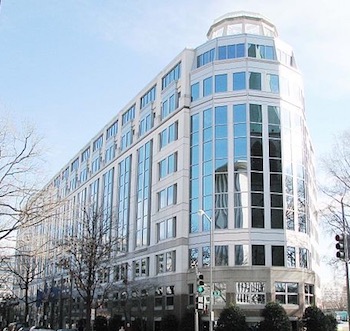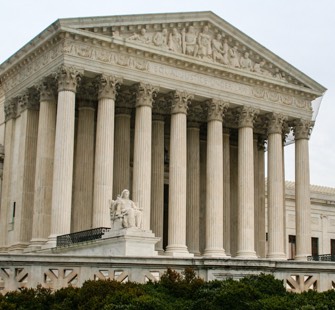PTO Director Nominee inches closer to confirmation
 Immediately prior to the holiday recess on Capitol Hill, Andrei Iancu (pictured left), President Trump’s nominee to become the new Under Secretary of Commerce for Intellectual Property and the Director of the United States Patent and Trademark Office, was unanimously approved by the Senate Judiciary Committee.
Immediately prior to the holiday recess on Capitol Hill, Andrei Iancu (pictured left), President Trump’s nominee to become the new Under Secretary of Commerce for Intellectual Property and the Director of the United States Patent and Trademark Office, was unanimously approved by the Senate Judiciary Committee.
“Mr. Iancu has a proven record in the field of intellectual property law,” Senator Chuck Grassley (R-IA) said moments before the vote. “He has an excellent academic and professional background in intellectual property law. He’s extremely knowledgeable about the patent system. He’s well respected in the legal community.”
“We congratulate Mr. Iancu on his support from the U.S. Senate Judiciary Committee to be Director of the U.S. Patent and Trademark Office,” said Innovation Alliance Executive Director Brian Pomper. “We believe he will heed the views of independent inventors, entrepreneurs, and various industry groups—all those that form our U.S. innovation ecosystem.” Pomper went on to urge the full Senate to approve the Iancu nomination as soon as possible. “We look forward to working with Mr. Iancu in creating a strong and stable U.S. intellectual property landscape for entities of all sizes, enabling the U.S. to reassert its position as an international leader in innovation,” Pomper said.
Favorably reporting Andrei Iancu to the full Senate for confirmation as Director of the USPTO is an important next step along the nomination path.
Iancu was originally nominated by President Trump in August 2017. The Senate Judiciary Committee held its hearing on his nomination on November 29, 2017, unanimously voting on December 14, 2017 to favorably report his nomination to the entire Senate for action. As of yet, there is no scheduled vote on the Iancu nomination in the Senate, although Senators are back from their holiday recess and have started taking up nominations. See Iancu Nomination Actions.
For more information on the Iancu nomination please see:
PTAB denies claims of 11th Amendment sovereign immunity
 Several weeks ago, the Patent Trial and Appeal Board (PTAB) of the United States Patent and Trademark Office (USPTO) denied a motion filed by the University of Minnesota in a series of inter partes review (IPR) cases. See Order Denying Patent Owner’s Motion to Dismiss. This extraordinary denial of the motion is newsworthy because Minnesota sought a dismissal of the IPRs based on Eleventh Amendment sovereign immunity. The PTAB previously dismissed similar IPRs against state-owned patents. Here, however, the PTAB in a majority opinion authored by Chief Judge David Ruschke (pictured left), disagreed and refused to dismiss the IPRs.
Several weeks ago, the Patent Trial and Appeal Board (PTAB) of the United States Patent and Trademark Office (USPTO) denied a motion filed by the University of Minnesota in a series of inter partes review (IPR) cases. See Order Denying Patent Owner’s Motion to Dismiss. This extraordinary denial of the motion is newsworthy because Minnesota sought a dismissal of the IPRs based on Eleventh Amendment sovereign immunity. The PTAB previously dismissed similar IPRs against state-owned patents. Here, however, the PTAB in a majority opinion authored by Chief Judge David Ruschke (pictured left), disagreed and refused to dismiss the IPRs.
The PTAB ruled that the University of Minnesota “waived its Eleventh Amendment immunity by filing an action in federal court alleging infringement of the patent being challenged in this proceeding.”
01.11.18 | Inter Partes Review, Patent Issues, USPTO | Gene Quinn
Rovi wins at ITC over Comcast
 The U.S. International Trade Commission has issued a final determination finding a violation of section 337 in a matter dealing with infringement of patents owned by Rovi Corporation. As a result of the investigation, the ITC issued a limited exclusion order prohibiting importation of certain digital video receivers and hardware and software components, and also issued cease and desist orders directed to the Comcast respondents. This final determination concludes the matter at the ITC and the investigation is now terminated, with this final determination submitted to President Trump for his review.
The U.S. International Trade Commission has issued a final determination finding a violation of section 337 in a matter dealing with infringement of patents owned by Rovi Corporation. As a result of the investigation, the ITC issued a limited exclusion order prohibiting importation of certain digital video receivers and hardware and software components, and also issued cease and desist orders directed to the Comcast respondents. This final determination concludes the matter at the ITC and the investigation is now terminated, with this final determination submitted to President Trump for his review.
The Commission instituted this investigation on May 26, 2016, based on a complaint filed by Rovi Corporation and Rovi Guides, Inc. (collectively, “Rovi”), both of San Carlos, California. The complaint alleged violations of section 337 of the Tariff Act of 1930, codified at 19 U.S.C. 1337 (“section 337”). Rovi asserted infringement of U.S. Patent Nos. 8,006,263; 8,578,413; 8,046,801; 8,621,512; 8,768,147; 8,566,871; and 6,418,556.
Prior to the evidentiary hearing, Rovi withdrew certain allegations, but proceeded at the evidentiary hearing on the following patents and claims: claims 7, 18, and 40 of the ’556 patent; claims 1, 2, 14, and 17 of the ’263 patent; claims 1, 5, 10, and 15 of the ’801 patent; claims 12, 17, and 18 of the ’871 patent; claims 1, 3, 5, 9, 10, 14, and 18 of the ’413 patent; and claims 1, 10, 13, and 22 of the ’512 patent.
On May 26, 2017, the administrative law judge (the “ALJ”) issued the final initial determination, which found a violation of section 337 by Respondents in connection with the asserted claims of both the ’263 and ’413 patents. After examining the record in this investigation, the Commission affirmed the final initial determination conclusion that Comcast violated section 337 in connection with the asserted claims of the ’263 and ’413 patents. The Commission also affirmed the conclusion that Comcast’s customers directly infringe the ’263 and ’413 patents. Read the rest of this entry »
12.21.17 | ITC, Patent Issues | Gene Quinn
SAS Institute v. Matal: Oral argument suggests a split at Supreme Court
 The United States Supreme Court heard oral arguments in SAS Institute v. Matal on Monday, November 27, 2017. This case should give the Supreme Court the opportunity to declare whether the Patent Trial and Appeal Board must issue a written decision covering all claims challenged in an inter partes review proceeding, and based on the oral argument transcript, the Court may also decide whether partial IPR institutions are permissible under the statute.
The United States Supreme Court heard oral arguments in SAS Institute v. Matal on Monday, November 27, 2017. This case should give the Supreme Court the opportunity to declare whether the Patent Trial and Appeal Board must issue a written decision covering all claims challenged in an inter partes review proceeding, and based on the oral argument transcript, the Court may also decide whether partial IPR institutions are permissible under the statute.
The issue specifically taken by the Supreme Court is as follows:
Does 35 U.S.C. § 318(a), which provides that the Patent Trial and Appeal Board in an inter partes review “shall issue a final written decision with respect to the patentability of any patent claim challenged by the petitioner,” require that Board to issue a final written decision as to every claim challenged by the petitioner, or does it allow that Board to issue a final written decision with respect to the patentability of only some of the patent claims challenged by the petitioner, as the Federal Circuit held?
12.20.17 | posts | Gene Quinn
Andrei Iancu unanimously approved by Senate Judiciary Committee
 On Thursday, December 14, 2017, President Trump’s nominee to become the new Under Secretary of Commerce for Intellectual Property and the Director of the United States Patent and Trademark Office was unanimously approved by the Senate Judiciary Committee.
On Thursday, December 14, 2017, President Trump’s nominee to become the new Under Secretary of Commerce for Intellectual Property and the Director of the United States Patent and Trademark Office was unanimously approved by the Senate Judiciary Committee.
“Mr. Iancu has a proven record in the field of intellectual property law,” Senator Chuck Grassley (R-IA) said moments before the vote. “He has an excellent academic and professional background in intellectual property law. He’s extremely knowledgeable about the patent system. He’s well respected in the legal community.”
“We congratulate Mr. Iancu on his support from the U.S. Senate Judiciary Committee to be Director of the U.S. Patent and Trademark Office,” said Innovation Alliance Executive Director Brian Pomper. “We believe he will heed the views of independent inventors, entrepreneurs, and various industry groups—all those that form our U.S. innovation ecosystem.” Pomper would go on to urge the full Senate to approve the Iancu nomination as soon as possible. “We look forward to working with Mr. Iancu in creating a strong and stable U.S. intellectual property landscape for entities of all sizes, enabling the U.S. to reassert its position as an international leader in innovation,” Pomper said. Read the rest of this entry »





No Comments
01.12.18 | posts | Gene Quinn